Can an app diagnose skin cancer?
Melanoma can spread quickly
Found early, this skin cancer is highly treatable. Once melanoma spreads, treatment becomes more difficult.
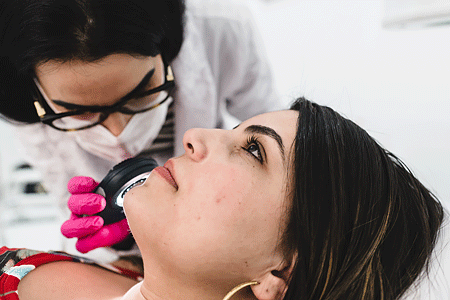
If you’re looking for smartphone apps to help you manage your health during the coronavirus pandemic, you’ll find plenty of choices. Before you trust your health to a skin cancer app, here’s what you should know.
Studies show apps that detect skin cancer give misleading advice
Using an app may seem like a quick and easy way to find out if a spot on your skin could be cancer. However, studies show that these apps can give you misleading advice.
In looking at the results from nine studies that tested the accuracy of these apps, dermatologists discovered the following:
These apps miss skin cancers.
These apps give different results for the same spot.
None of the apps can find a colorless melanoma, also called amelanotic melanoma.
An app may spot some potential melanomas but be unable to detect other types of skin cancer.
Takeaway
If you rely on a smartphone app to find skin cancer, you risk missing a possible skin cancer, including melanoma. If you have melanoma, it can spread quickly.
To find skin cancer early, dermatologists recommend that you:
Keep all follow-up appointments for skin exams with your dermatologist. To shelter in place, you may be able to meet with your dermatologist via telemedicine.
While apps that examine spots on your skin tend to be unreliable, other skin cancer apps can be helpful.
Check your own skin for signs of skin cancer
Skin self-exams can help you find melanoma early and get treatment, which reduces your risk of the cancer spreading to other areas of your body.
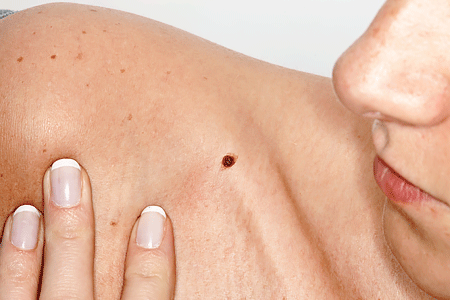
How skin cancer apps can help you
Do you forget to check your skin for skin cancer? Do you rely on your memory to decide whether a mole has changed? If you answered yes to either question, there’s an app that can help.
Look for skin cancer apps that allow you to:
Set reminders to check your skin.
Store pictures that you take of your moles, so you can see any change (possible sign of an early melanoma).
Share photos with your dermatologist.
These apps can be incredibly helpful because most early skin cancers are found by people who notice a change to their skin. If an app can help you check your skin or jog your memory, it can be a lifesaver.
Takeaway
Apps can help you perform skin self-exams. As for deciding which spots could be skin cancer, that decision is best made by a board-certified dermatologist.
See a new or changing spot, see a dermatologist
If you notice a spot on your skin that is growing, bleeding, or changing in any way, it’s time to call a dermatologist. These are signs that a spot could be a skin cancer.
During the coronavirus pandemic, dermatologists are committed to providing the highest quality of patient care. To do this, some dermatologists offer telemedicine appointments. When you have a telemedicine appointment, you may meet with a dermatologist through a video conference or a telephone call. You may also send information, such as a picture of your spot, to your dermatologist through a patient portal.
By looking at a spot online, a dermatologist can often tell whether you need to come into the office for a closer look at your spot.
If you need a dermatologist, go to: Find a dermatologist.
Related AAD resources
Images
References
Bowers J. “Technology vs. skin cancer.” Dermatol World. 2019;29(6):24-30.
Craven J. “Misleading information is among barriers to progress.” Dermatol News. 2019;50(6):12. [Expert analysis from 2019 AAD Annual Meeting]
Freeman K, Dinnes J, et al. “Algorithm based smartphone apps to assess risk of skin cancer in adults: Systematic review of diagnostic accuracy studies.” BMJ 2020;368:m127.
Hilton J. “The AI disruption: Computers with clinicians, delivering better care.” Dermato Times. 2019;40(12):1+.
Margosian E. “There’s an app for that.” Dermatol World. 2017;27(6):50-55.
Udrea A, Mitra GD, et al. “Accuracy of a smartphone application for triage of skin lesions based on machine learning algorithms.” J Eur Acad Dermatol Venereol. 2020 Mar;34(3):648-55.
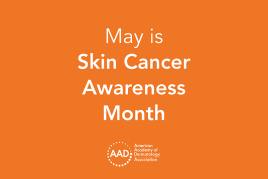 Think sun protection during Skin Cancer Awareness Month
Think sun protection during Skin Cancer Awareness Month
 How to care for your skin if you have lupus
How to care for your skin if you have lupus
 Practice Safe Sun
Practice Safe Sun
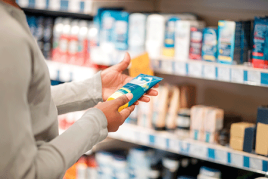 Sunscreen FAQs
Sunscreen FAQs
 Fade dark spots
Fade dark spots
 Hidradenitis suppurativa
Hidradenitis suppurativa
 Laser hair removal
Laser hair removal
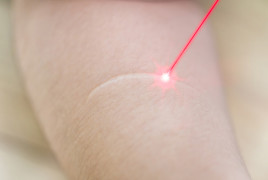 Scar treatment
Scar treatment
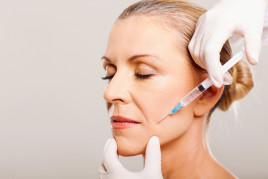 Botox
Botox
 Kids' camp - Camp Discovery
Kids' camp - Camp Discovery
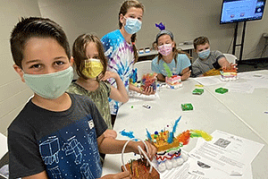 Dermatologist-approved lesson plans, activities you can use
Dermatologist-approved lesson plans, activities you can use
 Find a Dermatologist
Find a Dermatologist
 Why choose a board-certified dermatologist?
Why choose a board-certified dermatologist?